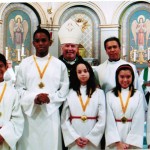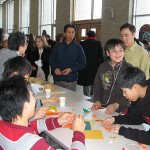Every now and then we may struggle through a time of crises in our lives. We may be dissatisfied with the way things are going in our marriage or a relationship or have a sense of unfulfilled possibilities in our careers. We may wonder if there is any meaning to our lives at all. What’s it all about, who am I anyway? What’s it all for? It’s all called identity crisis or midlife crisis. It can be a difficult time in our lives.
We meet John the Baptist again in today’s gospel. John the Baptist had no identity crises. He knew who he was; a voice crying out in a wilderness of doubt and uncertainty at that time. John knew what he was to do with his life, he was to ‘prepare the way of the Lord, and make straight his paths, get rid of all those barriers that hinder the growth of God’s life and love in people’s lives. John knew his vocation in life was to make way for some else, someone greater that he was, someone whose sandal strap he was unworthy to untie.
John the Baptist knew who he was and he knew who he was not; I am not the Messiah and he wouldn’t pretend to be. John’s job was to point to another and so he pointed out Jesus to his followers telling them, there is the Lamb of God, follow him. John was not the light he was to bear witness to the light. Referring to Jesus John said, I must decrease and he must increase and that’s what happened. John was beheaded in prison for telling King Herod it was not lawful for him to be married to his brother’s widow. With John’s death, his decreasing, Jesus was free to state his identity. He was anointed by God to bring good news to the oppressed, to bind up the broken hearted, to proclaim liberty to captives and set the downtrodden free.
‘I must decrease, he must increase.’ There are those who say that it was these words of John that brought the church to decide on the birth days of Jesus and John the Baptist. On June 21st we celebrate the summer solstice, the longest day of the year. From then on the days shorten. June 24th is the feast of John the Baptist and the days of the sun’s decreasing begin. Next Sunday we have the winter solstice, the shortest day of the years. Then the days begin, although very gradually, the days begin to lengthen. December 25th we celebrate the birth of Jesus and his increasing.
I must decrease and he must increase. That is the challenge of Advent and of all our lives. Our self-centeredness, our selfishness, our ‘me first’ mentality must decrease so that we may be graced with thought fullness for others, care for others, respect for others. We must decrease and Christ must increase in us so that such sins as bigotry and prejudice and racism and homophobia have no part in our relationships with others. We must decrease and Christ must increase so that our lives and hearts are with those who work for social justice, a living wage, adequate housing for all. We must decrease and Christ must increase so that we become more and more sensitive to the environmental issues of our age and make every effort to live simply that others may simply live.
As we spend these next weeks preparing materially and spiritually for the birthday of our savior, Jesus, son of God, son of Mary, may our mantra be – I must decrease, Christ must increase.
 Founded by St. Paul of the Cross, every Passionist takes a special vow to spend his or her energies in promoting remembrance of the sufferings of Jesus, the memory of the Cross, and reflection of the meaning of the Cross for the world.
Founded by St. Paul of the Cross, every Passionist takes a special vow to spend his or her energies in promoting remembrance of the sufferings of Jesus, the memory of the Cross, and reflection of the meaning of the Cross for the world.




